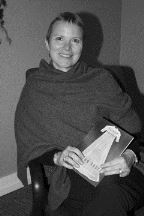Winter 2008, Volume 24.2
Poetry

Carolyn Forché
Carolyn Forché was born in Detroit, Michigan, in 1950. She studied at Michigan State University and earned an MFA from Bowling Green State University. Her first poetry collection, Gathering The Tribes (Yale University Press, 1976) won the Yale Series of Younger Poets Award. Her second book, The Country Between Us (Harper & Row, 1982) received the Poetry Society of America’s Alice Fay di Castagnola Award, and was the Lamont Selection of the Academy of American Poets. Her translation of Claribel Alegria’s work, Flowers From The Volcano, was published by the University of Pittsburgh Press in 1983, and that same year, Writers and Readers Cooperative published El Salvador: Work of Thirty Photographers, for which she wrote the text. She has worked as a correspondent in Beirut, Lebanon and as a human rights liaison in South Africa. The Ecco Press published her translations of surrealist and French Resistance poet Robert Desnos in 1991. Carolyn Forché’s awards include a John Simon Guggenheim Foundation Fellowship, as well as three fellowships from The National Endowment for the Arts, and a Lannan Literary Award. In 1992, she received the Charity Randall Citation from the International Poetry Forum. In 1993, W.W. Norton & Co. published her anthology, Against Forgetting: Twentieth Century Poetry of Witness. In March, 1994, her third book of poetry, The Angel of History, (HarperCollins Publishers) received the Los Angeles Times Book Award. Her fourth book of poetry is Blue Hour (HarperCollins, 2004). Read a conversation with Carolyn Forché in Weber.
The Museum of Stones
These are your stones, assembled in matchbox and tin,
collected from roadside, culvert and viaduct,
battlefield, threshing floor, basilica, abattoir—
stones, loosened by tanks in the streets
from a city whose earliest map was drawn in ink on linen,
schoolyard stones in the hand of a corpse,
pebble from Apollinaire’s oui,
stone of the mind within us
carried from one silence to another
stone of cromlech and cairn, schist and shale, horneblende,
agate, marble, millstones, ruins of choirs and shipyards,
chalk, marl, mudstone from temples and tombs,
stone from the silvery grass near the scaffold,
stone from the tunnel lined with bones,
lava of a city’s entombment,
chipped from lighthouse, cell wall, scriptorium,
paving stones from the hands of those who rose against the army,
stones where the bells had fallen, where the bridges were blown,
those that had flown through windows, weighted petitions,
feldspar, rose quartz, blueschist, gneiss and chert,
fragments of an abbey at dusk, sandstone toe
of a Buddha mortared at Bamiyan,
stone from the hill of three crosses and a crypt,
from a chimney where storks cried like human children,
stones newly fallen from stars, a stillness of stones, a heart,
altar and boundary stone, marker and vessel, first cast, load and hail,
bridge stones and others to pave and shut up with,
stone apple, stone basil, beech, berry, stone brake,
stone bramble, stone fern, lichen, liverwort, pippin and root,
concretion of the body, as blind as cold as deaf,
all earth a quarry, all life a labor, stone-faced, stone-drunk
with hope that this assemblage of rubble, taken together, would become
a shrine or holy place, an ossuary, immoveable and sacred
like the stone that marked the path of the sun as it entered the human dawn.
